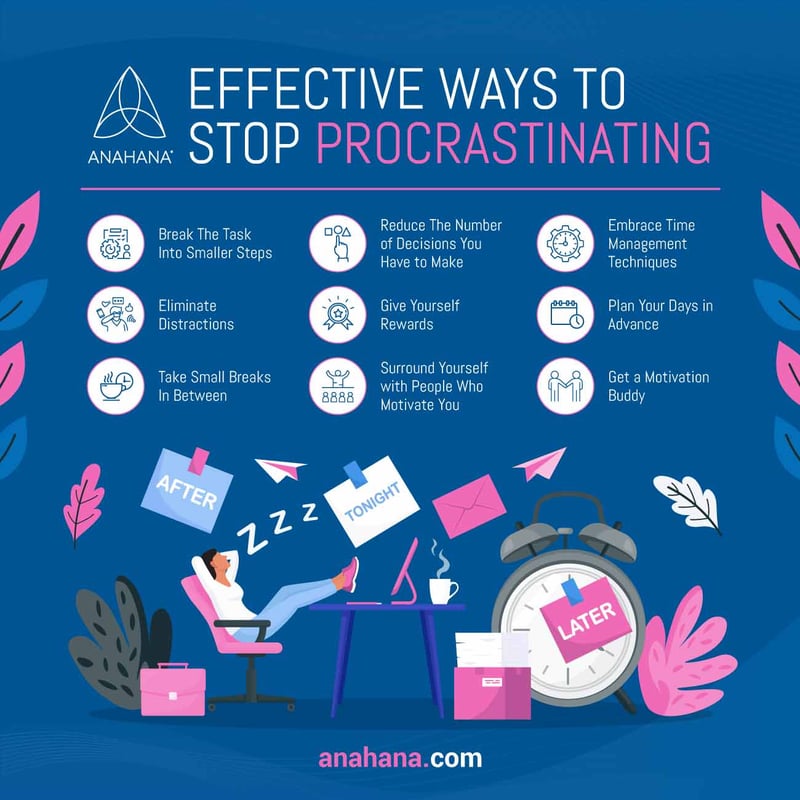
Table of Contents
Learn more about procrastination, why people procrastinate and practical ways to stop procrastinating in the near future.
What is Procrastination?
When we procrastinate, we find ourselves delaying tasks or responsibilities that we know are important. This delay often brings with it feelings of discomfort, anxiety, and self-criticism.
But here's the thing: procrastination doesn't mean we're lazy or incapable. Instead, it's a signal for us to explore what's really going on inside. Maybe it's fear of failing, feeling unsure, or wanting everything to be perfect.
Think about those times when you've put things off. It's not just about not wanting to do them, but the uncomfortable feelings we have when we think of the task, and what we make that mean about ourselves.
The good news is, there is always hope. By being kind to ourselves and understanding why we're putting things off, we can learn more about ourselves and grow.
Why Do We Procrastinate?
Freeze State
Sometimes, when life becomes overwhelming, our bodies react instinctively, entering what's known as a 'freeze state.' It's not something we consciously choose; it's our body's way of conserving energy and shielding itself from perceived threats. In this state, we might feel stuck, unmotivated, or even numb. But it's important to know that change is possible, and this feeling won't last forever.
Analysis Paralysis
Analysis paralysis occurs when we get so wrapped up in thinking about a decision that we struggle to actually make it. It's tough for anyone, and for those of us managing conditions like ADHD, decision-making can be even trickier to navigate or stay focused on an important task.
Part of what contributes to analysis paralysis is our tendency to set unrealistic expectations for ourselves (my fellow perfectionists and sufferers of imposter syndrome can likely relate to this). We might believe that every decision has to be perfect or that we have to consider every possible outcome before moving forward. These high standards can leave us feeling overwhelmed and unsure of where to begin.
Encouragingly, there are strategies, both emotion-based and time management techniques, we can use to overcome analysis paralysis and make decisions more effectively.
Anxiety and Avoidance
Anxiety and avoidance tend to show up when certain tasks trigger feelings of inadequacy or fear of judgment. It's like shying away from the spotlight because deep down, we fear we're not enough. These feelings often stem from what psychologists call "defectiveness schemas"—deep-seated beliefs that we're fundamentally flawed or unworthy. They can make even the simplest tasks feel overwhelming, like we're constantly battling against ourselves.
Chronic procrastination exacerbates this cycle, trapping us in a loop of avoidance and self-doubt. But we can challenge these beliefs. By breaking tasks into smaller steps and celebrating progress, we build confidence. It's about embracing imperfections and rewriting the script for a more empowered life.
Burnout
Burnout is like hitting an emotional wall, leaving us drained, detached, and feeling less accomplished. Interestingly, studies suggest that the more we procrastinate, the more likely we are to experience these burnout symptoms. It's almost as if procrastination becomes a shield against the anxiety and stress we feel.
Especially in school or work environments, where deadlines and pressures are everywhere, procrastination often leads to burnout. Recognizing this connection helps us understand how our habits affect our well-being. It reminds us to treat ourselves and our challenges with kindness and empathy.
What Happens When We Procrastinate?
When we procrastinate, it's like inviting a swarm of negative emotions to the party. Stress, guilt, anxiety, and frustration tend to crash in, making themselves right at home. And as they settle in, they can throw our sense of self-control for a loop, leaving us feeling scattered and overwhelmed.
When we procrastinate, we often find ourselves flooded with a mix of hard and negative feelings.
But the effects of procrastination don't stop there. They can really take a toll on our mental health, setting off a chain reaction of negative consequences. Our productivity takes a hit, making it tough to achieve our goals and meet our obligations. And as the pressure mounts, it can strain our relationships and leave us feeling isolated.
Understanding the grip that procrastination has on us is the first step toward breaking free. By acknowledging the emotions it stirs up and taking proactive steps to address them, we can reclaim our sense of control and steer ourselves toward a more fulfilling path.
Overcoming Procrastination

There is always hope! When we get better at identifying the root cause of procrastination it becomes easier to find the best way forward.
There are different ways you can prevent and overcome procrastination. It first starts with becoming fully aware that you indeed have a tendency to procrastinate and analyzing what can be the reasons why you do so.
Step 1: Notice You Are Procrastinating
It may seem simple, but noticing when we're stuck in autopilot or putting off important tasks is essential. We've got to acknowledge the behavior before we can change it.
Signs you might be procrastinating include:
-
Doing low-priority tasks instead of the important ones
-
Delaying tasks on your to-do list
-
Getting lost in social media or other distractions
-
Waiting for the "right mood" to tackle a task
Step 2: Identify Your Procrastination Triggers
Before we can learn how to stop procrastinating, we must take a closer look at the patterns surrounding our procrastination: what sets it off, how we tend to cope, and the habits we fall into.
Consider these potential triggers:
-
Feeling overwhelmed
-
Feeling disinterested or bored
-
Feeling anxious
-
Dealing with self-doubt
Step 3: Counteract the Trigger
Now that you've identified your procrastination triggers, let's explore some practical strategies to address them:
-
Feeling overwhelmed? Break it Down: When tasks feel like mountains, break them into manageable molehills. Taking small, achievable steps can make the workload feel less daunting and build a sense of accomplishment along the way.
-
Disinterested or bored? Try the Pomodoro Technique: Work in short bursts of focused activity, like 25 minutes, followed by a short break. This method helps maintain concentration and energy levels, making tasks more engaging and manageable.
-
Feeling anxious? Journal or Move: Take a moment to journal your thoughts or engage in gentle movement like walking (nature walks can be particularly calming) or stretching. These activities can help release tension and quiet the mind, allowing for clearer thinking and a calmer state of being.
-
Dealing with self-doubt? Challenge Your Thoughts: When self-doubt creeps in, take a moment to question those negative thoughts. Embrace your inner strength and remind yourself of past successes. Practice self-compassion and affirmations that resonate with you to cultivate a more positive mindset and boost your confidence and mental health.
Step 4: Clarify and Equip Yourself
Now that you've addressed those triggers, let's make sure you're set to go. Do you have all the tools you need for the task at hand? Is the task itself well-defined? Uncertainty can sap your motivation, so if anything feels unclear, don't hesitate to ask for clarification. Remember, seeking guidance is just part of the journey!
Step 5: Be Kind to Yourself, Always
Put self-compassion into action. for the next week, try to do something kind or loving for yourself each day.
When faced with that task you'd rather not have to deal with, take a moment to pause and breathe deeply. As you exhale, let go of any tension and offer yourself gentle words of comfort and encouragement.
During stressful times, your sympathetic nervous system may go into overdrive, clouding your thoughts and making productivity challenging. By engaging in deep breathing exercises like box breathing and speaking to yourself with kindness, you activate your parasympathetic nervous system. This shift not only eases stress but also promotes clearer thinking and a sense of calm.
Remember, practicing self-compassion is key. Allow yourself the space to acknowledge your feelings and be gentle with yourself as you navigate through challenges. Trust in your ability to overcome obstacles with grace and resilience, one step at a time.
Takeaway
Learning to stop procrastinating requires time and patience; therefore, using the strategies described in this article and figuring out what works best for you can help you care about your future self and avoid procrastination.
Frequently Asked Questions
How might I offer myself more compassion and understanding when I find myself procrastinating?
When we encounter moments of procrastination, it's an invitation to approach ourselves with tenderness and understanding. Often, procrastination stems from deeper fears or uncertainties within us.
Instead of chastising ourselves for not moving forward, let's practice gentle self-talk. Imagine speaking to yourself as you would to a dear friend facing a similar challenge.
Allow space for the acknowledgement that it's normal to feel overwhelmed or uncertain at times. By embracing self-compassion, we cultivate a nurturing inner dialogue that helps dissolve the grip of our procrastination habit.
What role does perfectionism play in my tendency to procrastinate?
When we encounter moments of procrastination, it's an invitation to approach ourselves with tenderness and understanding. Often, procrastination stems from deeper fears or uncertainties within us.
References
How to Stop Procrastinating - Overcoming the Habit of Delaying Important Tasks
How to Stop Procrastinating: Tips and Techniques for Overcoming Procrastination
Procrastination: A Scientific Guide on How to Stop Procrastinating
Understanding and Overcoming Procrastination | McGraw Center for Teaching and Learning
Disclaimer
The contents of this article are provided for informational purposes only and are not intended to substitute for professional medical advice, diagnosis, or treatment. It is always recommended to consult with a qualified healthcare provider before making any health-related changes or if you have any questions or concerns about your health. Anahana is not liable for any errors, omissions, or consequences that may occur from using the information provided

By: Anahana
The Anahana team of researchers, writers, topic experts, and computer scientists come together worldwide to create educational and practical wellbeing articles, courses, and technology. Experienced professionals in mental and physical health, meditation, yoga, pilates, and many other fields collaborate to make complex topics easy to understand. Anahana is also home to specialists in crystals, tarot, angel numbers, astrology, life path numbers, zodiac signs, and horoscopes. By combining evidence-based wellness with spiritual and energetic practices, the team offers clear, trustworthy guidance for both mind-body health and modern spirituality.